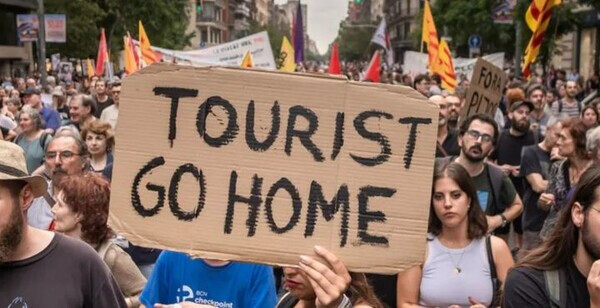
The Spanish government's order to close tens of thousands of short-term rental properties listed on Airbnb, citing housing shortages and soaring rents, has reignited the long-standing conflict between the tourism industry and the right to housing. This measure is seen as a comprehensive response to widespread criticism that the unchecked growth of the short-term rental market is threatening the lives of local residents.
On May 30 (local time), Spanish authorities ordered the suspension of operations for approximately 66,000 short-term rental properties posted on the accommodation-sharing platform Airbnb. This was due to these properties violating regulations concerning tourist housing. Specifically, the properties identified were found to have either not provided the required license numbers, submitted incorrect license numbers, or failed to clearly indicate the legal nature or status of the property owner. A local court has ruled that Airbnb must immediately withdraw 5,800 properties identified by the government from the market, with additional rulings expected for the remaining 60,000 properties.
Airbnb has strongly opposed this decision and announced its intention to appeal. In an interview with CNN, Airbnb stated, "We will appeal every decision that impacts this case," and argued that "the government is using indiscriminate methodologies, even for rental properties that do not require a license." Furthermore, Airbnb countered that Spain's housing crisis is not due to short-term rentals but rather a fundamental shortage of housing supply, criticizing the government's action as being in violation of EU law, Spanish law, and previous rulings by the Spanish Supreme Court.
However, the Spanish government maintains a firm stance. Pablo Bustinduy, Spain's Minister of Consumer Rights, strongly criticized, "The 66,000 short-term rental properties were originally homes for families, workers, and students." He added, "However, they are being driven out of their neighborhoods today, watching their cities turn into theme parks for the excessive profits of a few investment funds and large corporations." He emphasized that this measure is not just a tourism issue but a matter of "defending the right to housing," stating that the commercialization of housing can no longer be tolerated when citizens cannot find homes to live in. Prime Minister Pedro Sánchez also revealed earlier this year a plan to impose higher taxes on short-term rental operators, demonstrating the government's strong commitment to regulating shared accommodation.
This large-scale crackdown is closely linked to the severe housing crisis experienced by major Spanish cities. The Spanish Sociological Research Institute warned, "As the number of homes listed on shared accommodation platforms like Airbnb rapidly increases, major cities like Madrid, Barcelona, and Valencia are facing a housing rental crisis." According to statistics from local real estate websites, rental prices across Spain have risen by 85% per square meter over the past decade, with tourism and seasonal rentals identified as major contributing factors to this increase. In Barcelona, rents have skyrocketed by 70% and housing prices by 38% in the past decade, while in Madrid, rents have doubled and housing prices have surged by 44%, exacerbating housing affordability issues.
This housing crisis has escalated beyond local residents' complaints, leading to large-scale protests. In Madrid, over 150,000 people participated, and hundreds of thousands across more than 40 Spanish cities took to the streets, chanting "Airbnb, get out of our neighborhoods!" They condemned the displacement of local residents due to short-term rentals and demanded immediate housing reforms. Notably, Barcelona, a prominent tourist city, announced a drastic plan to revoke the licenses of all 11,010 short-term rental properties registered on platforms like Airbnb by November 2028, in an effort to curb rising rents. Anti-tourism protests have also consistently occurred in other popular tourist destinations such as the Canary Islands and the Balearic Islands, indicating a deepening social conflict over the issue of over-tourism.
Spain attracted 94 million foreign tourists last year, making it the second most visited country in the world after France. While nearly 100 million tourists are expected to visit Spain this year, the surging tourism demand casts both light and shadow. The Spanish government's recent measure is part of its efforts to promote sustainable tourism and protect citizens' right to housing, marking a significant turning point in finding a balance to ensure that the growth of the tourism industry does not harm the stability and harmony of local communities. This move aligns with a global trend of major cities, including New York and Mexico City, strengthening regulations on shared accommodation platforms, posing a worldwide challenge for cities to remain "places to live" rather than "theme parks."
[Copyright (c) Global Economic Times. All Rights Reserved.]




























